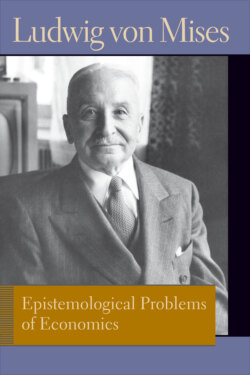Читать книгу Epistemological Problems of Economics - Людвиг фон Мизес - Страница 7
На сайте Литреса книга снята с продажи.
Оглавление[print edition page xi]
FOREWORD TO THE LIBERTY FUND EDITION
Ludwig von Mises’s early interest was in history. Because the School of Law at the University of Vienna offered the opportunity to study history, he enrolled in that School, graduated with “highest honors” in 1902, and received in 1906 a doctorate in both Canon and Roman Laws. His early writings were on economic history. He wrote about workers’ pensions, Austria’s factory legislation, monetary and banking policy, foreign exchange policy, etc. As he wrote in his Notes and Recollections, published after his death (1978): “The historical method was [then] believed to be the only scientific method for the sciences of human action.” However, as Mises saw it, the science of economics was an entirely different discipline from history and called for a very different methodology.
By 1930, Mises had written books on various aspects of economics—monetary theory, interventionism, socialism, liberalism, and cyclical policy. But he considered it important also to discuss the theory of economics, i.e., its methodology. He felt it should be explained how our understanding of economic operations comes about. So he collected several of his lectures and papers on the theory of knowledge, i.e., epistemology, wrote a new introductory paper on “The Task and Scope of the Science of Human Action,” and published this volume, Epistemological Problems of Economics (German original, Grundprobleme der Nationalökonomie, 1933).
The “epistemological problem,” as he saw it, was the prevailing opinion that the historical method was the only way to study economics. His purpose in compiling Epistemological Problems of Economics was to explain the epistemology of the sciences of human action, or economics. Economics was not history; it was a science of reason and logic. It concerned the actions of individuals cooperating, competing,
[print edition page xii]
and exchanging with one another. And it explained how the market, trade, money, prices, and other economic factors developed and brought about today’s modern, complex market economy. “[E]conomics provides us with universally valid knowledge” (p. 6). “Our science . . . considers only the essential. Its goal is the comprehension of the universal, and its procedure is formal and axiomatic. It views action and the conditions under which action takes place . . . as formal constructions that enable us to grasp the patterns of human action in their purity” (p. 12).
The future is separated from the past by the present, an infinitesimal instant between the past and the future. No one can know or predict the future. But it is possible to make some predictions, qualitative, not quantitative, in the field of economics on the basis of the principles and laws derived from the regularity in the sequence and concatenation of economic (market) phenomena. “When men realized that the phenomena of the market conform to laws, they began to develop catallactics, the theory of the market and the theory of exchange, which constitutes the heart of economics. After the theory of the division of labor was elaborated, Ricardo’s law of association enabled men to grasp its nature and significance, and thereby the nature and significance of the formation of society. . . . The discoveries made by Hume, Smith, Ricardo, Bentham, and many others may be regarded as constituting the historical beginning and foundation of a truly scientific knowledge of society” (p. 4).
This volume represents Mises’s early attempt to describe the science of human action. He later expanded this explanation in his German-language Nationalökonomie (1940) and still later and in greater detail in English as Human Action (1949). But the germs of the theory of human action are contained herewith. Here he points out that the science of economics “is a priori, not empirical. Like logic and mathematics, it is not derived from experience; it is prior to experience. It is, as it were, the logic of action and deed” (p. 12). “As thinking and acting men, we grasp the concept of action. In grasping this concept we simultaneously grasp the closely correlated concepts of value, wealth, exchange, price, and cost. They are all necessarily implied in the concept of action, and together with them the concepts of valuing, scale of value and importance, scarcity and abundance, advantage and disadvantage, success, profit, and loss” (p. 21).
[print edition page xiii]
This book’s main contribution is in explaining that economics is “the science of human action that strives for universally valid knowledge.” The science of human action is economic theory; it is not a history of economic phenomena.
Bettina Bien Greaves
April 2012
